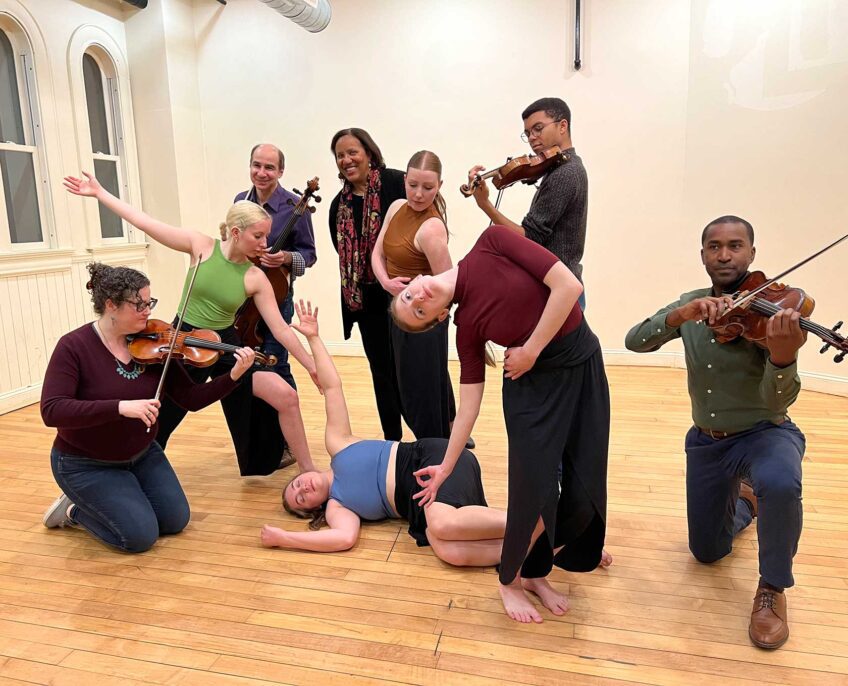Playwright Katori Hall focuses on the black experience in ‘Saturday Night/Sunday Morning’

Memphis-born playwright Katori Hall puts the focus on seven black women in a Memphis beauty parlor/ boarding house during the final days of World War II in “Saturday Night/Sunday Morning,” now playing at the Lyric Stage in Boston.
Hall’s earlier play, “The Mountaintop,” about a fictional encounter between Martin Luther King, Jr. and a hotel maid on the night before his assassination at the Lorraine Motel in Memphis, won Britain’s Laurence Olivier Award for “Best New Play” in 2010, making Hall the first African American woman in history to win the award.
Much like the women in “Saturday Night/Sunday Morning,” the playwright grew up getting her hair done on many a Saturday morning by a woman named Miss Mary who owned a beauty shop/boarding house not far from her grandmother’s home, giving Hall a front-row seat for both the “beauty stuff drama” and the “boarder stuff drama,” she says.
“People were coming in, asking Miss Mary for change, asking Miss Mary to borrow money, asking Miss Mary to do the impossible,” Hall says, speaking to the Banner recently.
The Memphis native held onto all that she witnessed and heard as a child growing up in that environment. She was inspired by those experiences, she says, but also has a “different lens” for this play.
On the Web
The Lyric Stage Company of Boston presents “Saturday Night/Sunday Morning” through Nov. 21. Tickets start at $25; seniors, $10 off regular price; student rush, $10. For more information or to purchase tickets, call the box office at 617.585.5678 or order online at www.lyricstage.com.
“I really wanted to look at the end of World War II, at black women’s stories during that time,” she says. “I just haven’t really seen that story. There’s not even a lot of scholarship surrounding black women’s lives during WWII. I decided it was a great opportunity to do that through a play.”
And so in “Saturday Night/Sunday Morning” (directed by Dawn M. Simmons), Hall touches upon issues that are still very relevant today —such as colorism, homophobia and racism — through the lives of these seven women.
Hall was a journalist and actress before becoming a playwright.
“Journalism was my first learning opportunity on how to create characters and also how to create authentic speech patterns for my characters,” she says.
During one summer she interned at The Boston Globe and realized, she says, how important it was for her to be authentic, to put down on the page, literally, what people were saying.
“Boston people have a very specific accent and dialect. It’s almost like they’re speaking their own language,” she notes. “I always feel like if you can capture the witticisms and the lilt and the sayings of a particular community, that you’re way in to the psychology of your characters or of a people. I would say journalism was my first window into the soul of humanity.”
Hall has written several other plays, including “Hurt Village,” set in a real-life Memphis housing project. The play centers on 13-year-old aspiring rapper, Cookie, and her mother, Crank. The two are being relocated from the housing project they call home when Cookie’s father suddenly returns from fighting in Iraq, only to find that his home and his community have changed.
She also made her directorial debut recently with the short film “Arkabutla” — also set in Memphis — about an African American professional bull rider on the black rodeo circuit, who is falsely accused of committing a crime.
“I needed to prove that I could direct,” says Hall, who is now gathering money for her next project, a film adaptation of “Hurt Village.”
“With theater, because it’s so transient, it’s something that happens in a very specific place, at a very specific time, for a very specific audience, and changes from night to night,” Hall says. “With film, you can create something and put it online or put it out to the world and everybody has access to it. I’m very excited for the amplification of my story. I just really feel it’s an extra wonderful platform to have when you’re telling stories about communities that have been under-represented or not represented at all.”




![Banner [Virtual] Art Gallery](https://baystatebanner.com/wp-content/uploads/2024/04/NJ-H_1-713x848.jpg)

